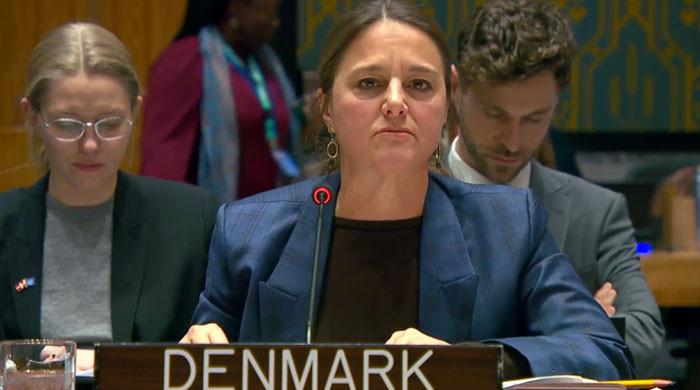- TTP benefits from Taliban support as attacks intensify: Denmark.
- China supports the UN listing of the BLA and the Majeed Brigade as terrorist groups.
- Pakistan says it has made heavy sacrifices in the fight against terrorism for decades.
The head of the UN Security Council’s Daesh and Al-Qaeda Sanctions Committee has supported Pakistan’s position that Afghan territory is being used to stage terrorist attacks in the country, warning that the banned Tehreek-e-Taliban Pakistan (TTP) project poses a serious threat to regional security.
Denmark’s Deputy Permanent Representative to the UN, Sandra Jensen Landi, as chair of the committee, presented a report to the UN Security Council, saying the terrorist group has carried out numerous high-profile attacks in Pakistan from Afghan soil, some of which resulted in numerous casualties.
She said the TTP, with its approximately 6,000 fighters, poses a serious threat emanating from the region, benefiting from both logistical and substantial support from the “de facto” authorities.
Landi made the statement as the 15-member Council was briefed by the heads of three of its subsidiary bodies – covering Daesh/Al-Qaeda, UN counterterrorism efforts and measures to prevent the proliferation of weapons of mass destruction to non-state actors – knowing that the threat posed by terrorism continues to evolve, particularly in Africa, as malicious actors exploit new technologies to pursue dangerous ends.
Islamabad and Kabul are experiencing increased tensions over the reluctance of the Afghan Taliban regime to act against terrorist groups operating from its soil, in a context of increasing terrorist attacks in Pakistan.
Commenting on the report, Pakistan’s Deputy Permanent Representative to the UN, Usman Jadoon, said the country had made invaluable sacrifices in its efforts to eradicate this menace, with over 80,000 casualties and billions of dollars in economic losses.
Al-Qaeda, he added, was decimated largely due to Pakistan’s efforts.
“Our valiant security forces and law enforcement agencies continue to counter the threat of terrorism emanating from Afghanistan, where entities like ISIL-K, TTP and its affiliates, BLA (Balochistan Liberation Army) and its Majeed Brigade thrive under the patronage of their hosts and supported by our main adversary and net destabilizer in the region,” he said, without naming India.
Ambassador Jadoon said the 1267 Committee’s sanctions regime must “reflect the ground realities” and that matters of listing and delisting must be handled “fairly, transparently and judiciously and without political considerations.”
The Pakistani envoy also stressed that in order to adopt a zero-tolerance approach, the UN’s counterterrorism architecture “must also have the necessary tools to designate violent, far-right, far-right, ultranationalist, xenophobic and Islamophobic groups around the world.”
Meanwhile, China’s representative urged committee members to support the listing of the Balochistan Liberation Army and its Majeed Brigade, “sending a strong signal of zero tolerance towards terrorism.”
Islamabad-Kabul tensions
Tensions between the two neighboring countries escalated when Taliban forces and the Indian-backed TTP, also known as Fitna al-Khawarij, resorted to an unprovoked attack on Pakistan on October 12.
The Pakistani armed forces gave a befitting response to the aggression, killing more than 200 Afghan Taliban and affiliated militants in a vigilante action.
The army’s media wing, Inter-Services Public Relations (ISPR), said 23 soldiers embraced martyrdom during clashes with Taliban forces and terrorists.
In addition, security forces also carried out “precision strikes” in Afghanistan’s Kandahar province and the capital Kabul, as well as in the border areas of North and South Waziristan districts, successfully destroying several strongholds in response to the aggression.
The two sides had agreed to a temporary ceasefire during the Doha talks on October 19 and subsequently held several meetings in Istanbul, with Pakistan aiming to devise a mechanism to end cross-border terrorism emanating from Afghan soil.
The Istanbul talks could not yield the desired results due to the stubbornness of the Afghan side as Kabul used the Istanbul talks to malign Pakistan rather than address Islamabad’s central concern regarding terrorism emanating from Afghan soil.




